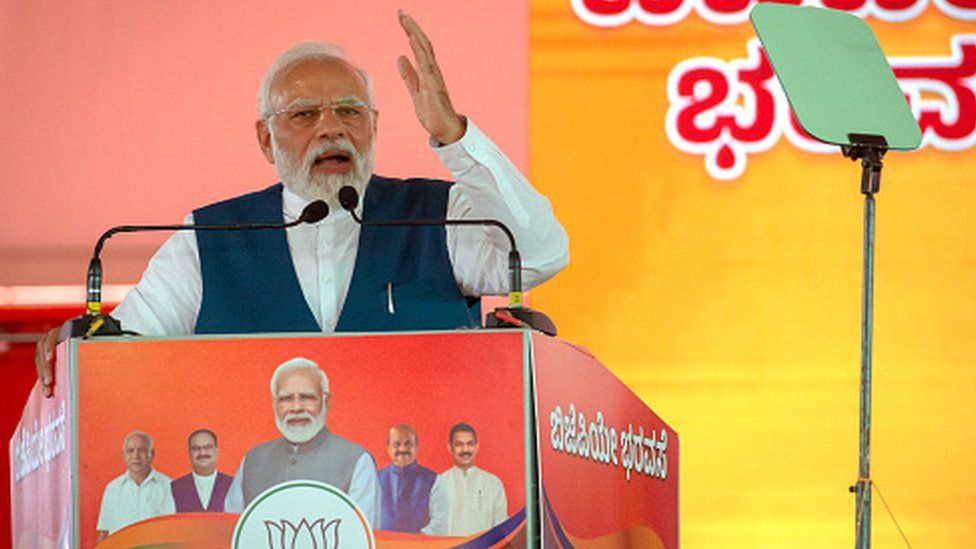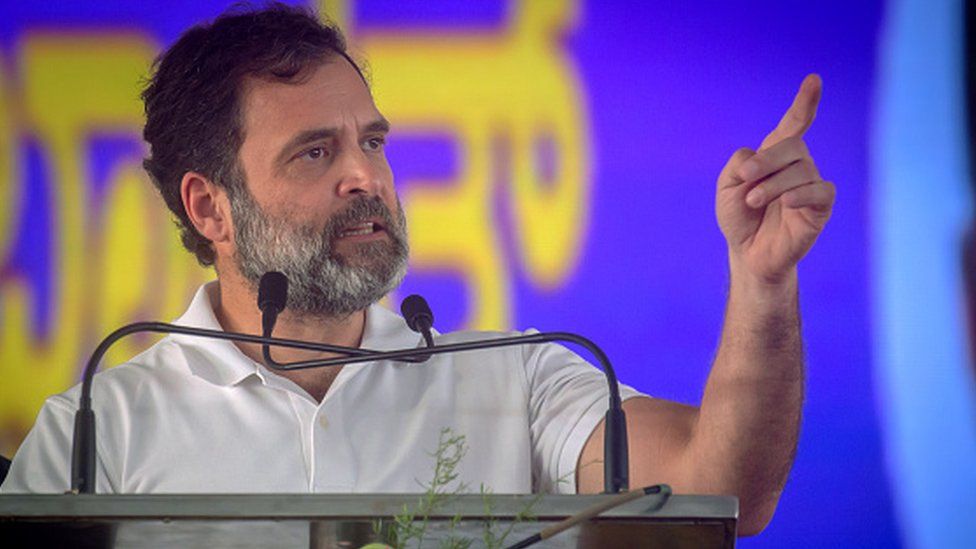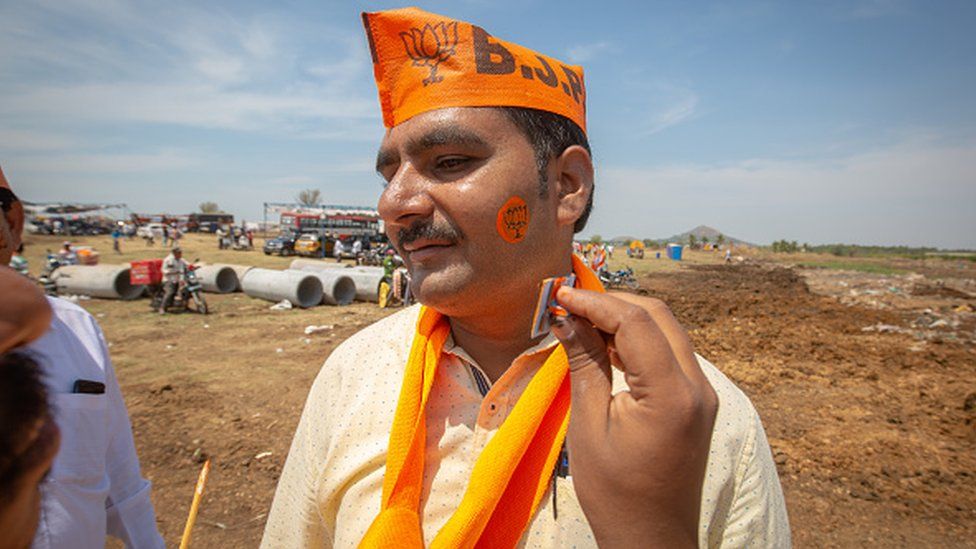
Leaders of India’s main political parties have been campaigning extensively in the southern state of Karnataka which goes to polls on Wednesday.
Prime Minister Narendra Modi has been on an election campaign blitzkrieg, addressing 17 public rallies and five roadshows in 10 days, to ensure his Bharatiya Janata Party (BJP) retains power in the state. In an unusual move, Mr Modi, who rarely stays away from capital Delhi, even spent two nights in the southern state for campaigning.
The main opposition Congress Party’s campaign is led by its president Mallikarjun Kharge and the members of the Gandhi family who have been criss-crossing the state, addressing dozens of rallies and meetings.
The assembly elections are significant as they come just a year ahead of the general elections in the summer of 2024 and analysts say they could be a harbinger of things to come.
So, BJP workers have looked up to Mr Modi’s campaign with great expectations. His campaign is also significant because it could lift the fortunes of his party in a state that has never returned a ruling party since 1985.
In the last election in 2018, the BJP secured 104 seats, falling short of a majority against the Congress and the Janata Dal Secular (JDS) coalition in the state.
The party then deployed a concerted effort to engineer defections from the Congress and the JDS – the coalition government collapsed a year later as its members resigned to join the BJP soon after it won the 2019 general elections. The BJP has ruled the state since then.
“If the BJP loses, it will mean that it has not been able to make any headway in southern India,” A Narayana, professor of political science at Azim Premji University, tells the BBC.
“But if the BJP wins, the energy it will generate among its workers in the neighbouring states of Telangana, Andhra Pradesh and Tamil Nadu will be substantial.”

This is also the first election in which the BJP’s regional satrap BS Yediyurappa did not lead the campaign. A former chief minister, Mr Yediyurappa has been widely credited for steering the party to power first in 2008 and has played a major role in forming the government in 2019 after a hung verdict in 2018.
Analysts say a victory in Karnataka will be a huge boost for the Congress, one that could energise its workers in north Indian states like Rajasthan, Madhya Pradesh and Chhattisgarh which go to the polls later this year.
In fact, the Congress has an edge in Karnataka because of its strong local leadership, says psephologist Sanjay Kumar.
“It is the party’s national leadership that is weak. No Congress leader at the national level has been able to pull votes for the party,” he adds.
Perhaps, this is where Mr Modi comes in for the BJP, whose ability to pull votes is enormous, experts say.
“In a sense, it reflects the high level of dependence the BJP has on the prime minister,” says Prof Sandeep Shastri, political analyst and pro-vice chancellor at the Jagran Lakeside University in Bhopal.
“Whether it is a state election or national election, the party believes that Mr Modi alone can get the vote.”
Karnataka goes to the polls on 10 May and the results will be declared on 13 May. The state saw a rather sedate start in the run-up to the elections, although campaigns routinely became acrimonious with both sides indulging in name-calling.
With anti-incumbency at a high, the BJP focussed on the achievements of its federal government, and not that of the state. Besides Mr Modi, several national leaders also campaigned in the state in the hopes of swaying the results in their favour.
The thrust of their campaign was largely populist. The party manifesto promises to provide free gas cylinders to the poor, subsidised food outlets across the state and free housing for the homeless.
It has also promised to implement the controversial Uniform Civil Code, a single personal law for all citizens irrespective of religion, sex, gender and sexual orientation.
The Congress, on the other hand, has criticised the BJP for ignoring important issues and running a corrupt government in the state – a charge denied by the BJP.
In its manifesto, the party has promised free electricity, 10kg (112lb) of rice per month to the poor, doles to women who head a family and free bus travel for women.

But it was the party’s promise to ban Bajrang Dal, a hardline Hindu group with ties to the BJP, that stirred up a storm. The Congress equated Bajrang Dal with the Popular Front of India (PFI), a controversial Muslim group which was outlawed last year.
The BJP accused the Congress of being “anti-Hindu”, saying the party had hurt the sentiments of the followers of the monkey god Hanuman, also known as Bajrang Bali.
Yogendra Yadav, political analyst and member of Swaraj India party, says the implications of the election results in Karnataka “are going to be huge”.
“The BJP has never got a majority on its own in Karnataka. If it does this time, it will tom-tom it all over the country to show that it has proof of its electoral acceptance in south India and prove that the Bharat Jodo Yatra [Congress leader Rahul Gandhi’s “unity march” across India] had no impact at all,” he says.
“This would demoralise the entire Opposition.”
Prof Kumar says even if the BJP loses in Karnataka, it would not harm its prospects in other state elections or the 2024 national elections. “But one more failure for the Congress will have a huge impact on the morale of party workers.”
Prof Shastri says that so far, the BJP has been on the backfoot, only reacting to the agenda set by the Congress. “Defending their record in governance would have required them to focus on performance which they don’t have [in the state].”
He adds that the party has heavily relied on Mr Modi’s ability to pull votes because it is facing difficulty in using its local leadership to that effect.
“But the question is – will voters give importance to state issues or not?”
BBC News India is now on YouTube. Click here to subscribe and watch our documentaries, explainers and features.

Read more India stories from the BBC:
- At least 22 dead as boat capsizes in south India
- Ethnic clashes in Indian state leave dozens dead
- Revisiting Covid front lines with India’s ‘Corona slayer’
- What went wrong with India’s Go First airline?
- The ‘dancing on the grave’ murder that shook India
- Why peace talks are not on Zardari’s agenda in India

